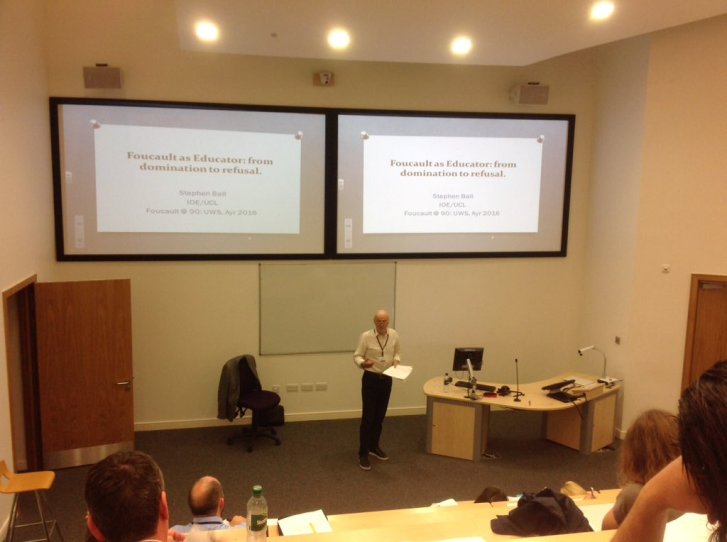I was fortunate enough to attend the recent Foucault @90 conference, held at the University of West of Scotland on the 22-23 June. It was well attended with a strong selection of papers and excellent keynotes from Prof. Mark Olssen, Dr. Clare O’Farrell and Prof. Stephen Ball. A conference wholly devoted to Foucault – what’s not to like?
Dr Clare O’Farrell giving keynote address @uwsfoucault today @UniWestScotland Thank you for the pic! #foucaultnews https://t.co/8WuFY94QkE
— Foucault @ 90 (@uwsfoucault) June 22, 2016
@UWSeducation @uwsfoucault pic.twitter.com/5aC9gaxhA3
— Amina Abdessalam (@aminabdessalam) June 22, 2016
Stephen Ball making the argument that Foucault was a theorist of liberation in his second day keynote
‘Foucault is a theorist of liberation, not oppression’ – Stephen Ball @uwsfoucault #foucault pic.twitter.com/PO4JYYKWdS
— Mark Murphy (@socialtheoryapp) June 23, 2016
What I particularly enjoyed about the conference was its lack of deference and willingness to think with Foucault and beyond his work. Evident among the presenters was a desire to match his ideas up with practical research agendas in specific cultural and national contexts. This desire was reflected in the ways in which presenters made connections between Foucault and other thinkers.
A lot of theory synthesis and hybridisation at @uwsfoucault. Good to see #foucault
— Mark Murphy (@socialtheoryapp) June 23, 2016
For example, two of the papers made connections between the work of Foucault and that of Erving Goffman – Chris Hollingsworth via the notion of ‘spoiled identity’ and Bjorn Harme through the concept of the ‘total institution’. These connections are strong examples of hybridization, a favourite pastime of this website and to be encouraged when using social theory in research (see our post Permission to theorise, for example).
Bjorn Hamre links Goffman’s ‘total institution’ to Foucault’s concept of the dispositive @uwsfoucault #foucault https://t.co/ZlcwlDvG6S
— Mark Murphy (@socialtheoryapp) June 22, 2016
Another paper linking Goffman to Foucault – spoiled identity & docile bodies in studies of criminals @uwsfoucault #foucault
— Mark Murphy (@socialtheoryapp) June 23, 2016
On reflection it doesn’t take a great deal of effort to see how such connections could be made – they share similar concerns with stigma, normality, performance. But there are surprisingly few studies that connect them (to my knowledge). This might be because Goffman and Foucault come from quite distinct intellectual traditions. It might also be the case that researchers are not normally encouraged to see these kind of connections and combine different approaches to form something new and distinctive. So any efforts to move past academic siloisation are to be welcomed – congratulations to the UWS staff for providing the opportunity to engage with such cross-fertilisation of ideas.
Thank you to all who took part @uwsfoucault a resounding success! @UniWestScotland #foucaultnews @UWSeducation pic.twitter.com/6XaJq6pP7o
— Foucault @ 90 (@uwsfoucault) June 23, 2016










